Tempest’s Downpour – The Americanization of Anime

Anime has changed considerably over the past few decades. But is this a trend more towards Americanization, or just the natural flow of the living, breathing entertainment industry?
There are three kinds of Americanization. The first is that which 4Kids and early dubbing companies are infamous for: erasing every cultural element from a program in order to make it more marketable with uninformed American masses. Though this practice is becoming less popular, it is still occurring and is widely disputed.
Then there’s the kind of Americanization where dubbing companies try to take jokes and cultural references in order to make them more relevant to American audiences. It still captures the funny of the original without throwing too much of its authenticity away. However, some recent dubs have taken these programs and flagrantly added American jokes – with very positive results.
The final type of Americanization seems to be happening in Japan itself. Animated programs seem to be less about magical girls, bizarre costumes and giant robots and more about the teen dramas that would appeal to a more American audience. Oftentimes, an anime takes place in New York or Chicago, making it even more American. This makes sense given that America is the largest consumer of anime worldwide.

Remember these guys?
- Cons:
- Loss of the original meaning
- Loss of cultural significance
- Sometimes loss of themes appealing to older audiences (death, romance, homosexuality, bloodshed, violence).
- Sometimes different music – and honestly, 9 times out of 10 the singer isn’t nearly as good as the Japanese version.
- Pros:
- Easier for American audiences to understand
- Jokes have better relevance for Americans
- Sometimes music gets improved (though rarely) or translated.
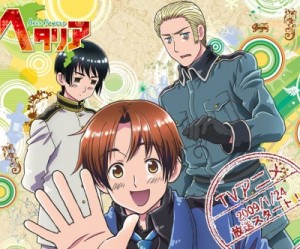
History has never looked so gay…
An example of a show where Americanization improved the content is Axis Powers Hetalia. My personal experience with this series is that the Japanese version of the anime offended me so badly I couldn’t watch it. The American version is ten times more offensive, with jokes that are more relevant to American audiences. With hilarious accents and jabs at America’s lack of cultural knowledge (“Polish horses never charged German tanks in the Battle of— right, anime fans… Germany attacked Poland in 1939—RIGHT, American fans. Poland is a country – in Europe!”), this has quickly become my current anime favorite.
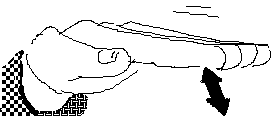
The signal for “come here” in Japanese can be likened to the American “forget about it.”
FUNimation in general seems to find a nice balance when localizing its programs. In Fruits Basket, Shigure tries to usher Tohru away from the battlefield in the dining room with an under-handed motion that does not translate into the American culture. To fix that, the dubbers instead had Shigure say “Never mind, don’t worry about those two,” matching his hand movement with an American “forget about it” hand gesture. The meaning of the discussion remained intact, but was easier to absorb for an American audience.
The perfect example of over-Americanization is any Saturday morning or prime time anime shown in America. If it’s made it to the television screen and doesn’t come with a warning, chances are it isn’t the same show it was in Japan. Even Japanese kids’ shows can contain themes of violence, death and homosexuality, which are taboo according to American standards. Couple that with names that are difficult to pronounce to begin with, and you have the perfect excuse for Americanization.
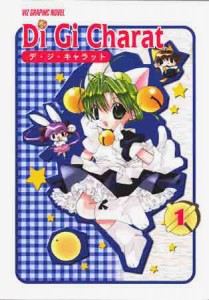
What this series lacks in plot it makes up for in… uh… I forgot
Despite the fact that fans tend to like to stick to the original as much as possible, some shows would have benefited from a bit of Americanization. The one constant complaint I hear about Di Gi Charat is the jokes “make no sense” or “are too Japanese.” The humor comprises mostly word puns that are near impossible to translate and surrealist humor that is a popular style of comedy in Japan, but does not work well with American audiences.
I grew up in the era of magical girls and gundams, but things are rapidly changing. Anime isn’t as much about the spectacle as it is about the story. I don’t know if such changes will leave oldschool fans in the dust, or if it’s something we should all embrace. Either way, the anime industry is a living, changing creature and the way we handle it — either as an object of reverence, or some money-making scheme — best shows how we feel towards it.



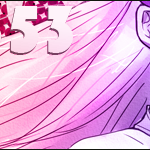

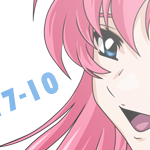
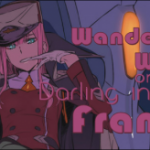








History has never looked so FABULOUS!
Poland is a country. In Europe.
I liked the early 90’s english dubs XD
Anime and manga is no doubt tied greatly to the story, also history could not look more fabulously gay- no homo. However these companies are just trying to get as much profit as possible, and being good capitalists by taking out the more historical and Japanese cultural impact of anime/manga.
These companies are definitely trying to make money, but are they going about it the right way? I think companies like FUNimation finally know how to appeal to their audiences, proving their success. As much as I’m resistant to Americanization, it may not be such a bad thing if handled properly and with care for the original content.
Funimation does a great job, but look at the success of Devil Kings in America (though the original was stripped of its core historical facts) Capcom America and even other vidja game markets as well are trying to appeal to America which has the biggest consumers in the world. America also has the biggest cultural network in the world which leads to more markets in other countries. It’s not a bad thing to make an industry for the american audience however are they doing it the right way.
We tend to forget about those awkward instances when anime itself crosses into American territory. Take Heroman for instance. Stan Lee wants his coffee!
As for things being “too Japanese”, despite its heavy handed J-pop culture references, we all still seem to love Lucky Star. I still don’t get that.
This was a great read, Tempy! 😀